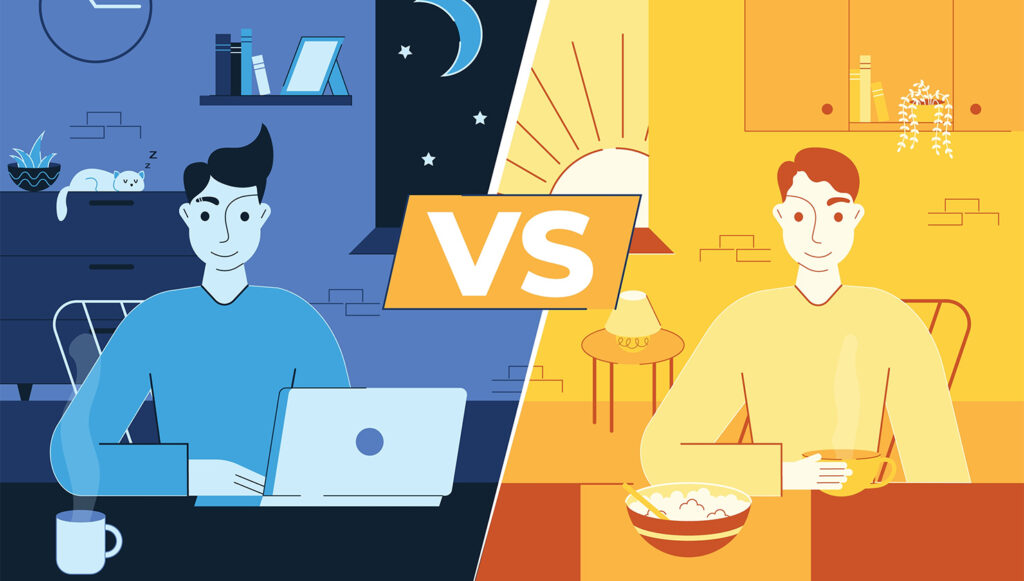Sleep is something we all need to be alive. However, our sleep schedules are not all the same because our bodies operate differently. Some of us prefer to get up early and go to sleep early. Other people function better late at night. What kind of sleeper are you? What is your “chronotype”? Find out with our quiz!
In case you’re not familiar with chronotypes and how they are linked to your quality of sleep, we prepared a handy little guide for your needs. Read on!
Chronotype quiz is a natural inclination your body has to fall asleep at a specific time. To understand it better, think about how some people are early birds, and others are night owls. Chronotype quiz has a connection to circadian rhythm, which controls your body’s day-night cycle and melatonin release.
The difference between chronotype quiz and circadian rhythm is that the latter is affected by outside triggers, like light and temperature. It also can be trained by sticking to a strict schedule. The chronotype cannot change, though it can shift on its own throughout your life.
Why is knowing your chronotype so crucial? The research suggests that there is a link between the chronotype and personality traits, overall health, and quality of life. Knowing your chronotype quiz, you can schedule daily activities for times when you’re well-rested and productive. Instead of fighting against your chronotype, it’s more beneficial to work with it.
Multiple factors can affect your chronotype quiz, including genetics, age, and perhaps even geographical location. Children usually wake up early, but during adolescence, their chronotype gets pushed back. From the age of 20, our chronotypes start getting earlier and earlier. For an average middle-aged adult, an optimal wake-up time falls between 7 AM and 8 AM, and a bedtime between 11 PM and 12 PM. Older adults wake up even earlier.
Most researchers agree that the chronotype quiz has a powerful genetic component. The PER3 gene contributes to individual differences in people’s sleep patterns and circadian rhythms. Additionally, scientific research tied a longer allele on the PER3 gene to being a morning person.
There is a theory that suggests chronotypes evolved in hunter-gatherers’ society. By taking turns sleeping, there would always be someone in the group keeping watch and protecting others from danger.
Scientists usually specify two categories of chronotypes: early birds (also known as morning larks) and night owls. However, a lot of people don’t fall neatly into one of these two types. Chronotypes are a spectrum, with most of us landing somewhere in between.
Dr. Michael Breus, a clinical psychologist, described four groups based on the characteristics of four different animals: the bear, the wolf, the lion, and the dolphin. Let’s explore these categories and figure out to which one you belong.
The bear chronotype is supposed to be the most common one, encompassing 55% of the world population. The people in that group usually follow the sun and have no problem waking up in the morning or falling asleep at night. This chronotype is the most productive between 10 AM and 2 PM and feels the energy decrease between 2 PM and 4 PM. The bear typically wakes up around 7 AM and goes to bed around 11 PM, sleeping for around eight hours.
This chronotype is well adjusted to the standard office schedule but also doesn’t have trouble with maintaining social life in the evenings.

If you are the bear chronotype, ensure to get enough sleep to maintain your energy levels. Additionally, try to schedule important meetings and exhausting errands in the morning, and finish up before the afternoon.
The wolf chronotype quiz is a typical night owl. It is believed to make up approximately 15% of the population. During the day, they have two bursts of energy – the first around noon and the second around 6 PM.
The wolf needs time in the morning to get themselves together for the day ahead. They tend to go to sleep at midnight or at a later time.
If you are the wolf chronotype, try to get ahead on your work at these times when you’re feeling the most awake.
The lion chronotype might also be called the early bird. They feel the most productive in the morning and get the majority of their work done by lunchtime. However, by the afternoon the lion feels exhausted and drained. This chronotype usually requires a power nap after 4 PM and an evening destress routine to unwind from the day.
The lion typically needs around eight hours of sleep per night to get energy for the morning. They can have trouble following a social schedule in the evening.
If you are the lion chronotype quiz, learn when to quit to avoid burnout and take care of yourself in the evenings.
The dolphin chronotype is the rarest of them all, only comprising 10% of the population. The real dolphins can stay aware even when sleeping. The human ones could be best described as insomniacs. The displays scattered sleep patterns, having trouble falling asleep and waking up during the night. The window of productivity for the dolphin falls between 10 AM and 2 PM each day.
If you are the dolphin chronotype, try to sleep from about midnight to 6 AM. Also, take breaks throughout the day if needed to reset.
What is your chronotype quiz? Take the quiz and find out your natural sleep rhythm! We hope you’ll have a good night’s sleep tonight. Before you pass out, share the quiz with friends!